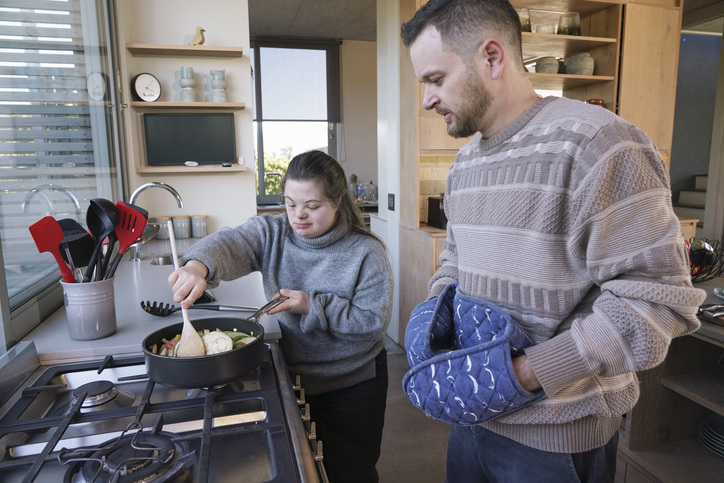Learning Disabilities, Autism and Oliver McGowan Training for Social Care Providers
Since July 2022, all CQC-registered providers have been required to ensure that staff receive learning disability and autism (LD&A) training. This applies across all regulated settings, not just those delivering specialist services for people with learning disabilities and autism, and is assessed under Regulation 18: Staffing of the Health and Social Care Act 2008 (Regulated Activities) Regulations 2014. More recently, this requirement has been strengthened through the Oliver McGowan Code of Practice and new LD&A content within the Care Certificate standards.
While these statutory duties are a requirement for CQC-regulated services, LD&A training is also increasingly important in children’s social care. For Ofsted-regulated providers, Oliver McGowan training is not mandatory, but it is the government’s preferred approach and offers a clear way to evidence good practice and compliance with inspection standards.
In this article, our team at ClouDoc explains what these updates mean for your service and how to ensure your staff training is both CQC-compliant and inspection ready.
The Oliver McGowan Code of Practice
On 6 September 2025, the Oliver McGowan Code of Practice came into force. This is the government’s preferred LD&A training for health and social care staff to help providers meet the requirements of Regulation 18. While providers may choose alternative training, it must meet both the standards set out in the Code and the expectations of Regulation 18.
The Code sets out four standards that all staff are required to meet:
Standard 1
All staff receive training that covers a minimum curriculum of capabilities from the ‘Core capabilities framework for supporting people with a learning disability’ and the ‘Core capabilities framework for supporting autistic people’ on the Skills for Health Supporting autistic people and/or people with a learning disability page. Further training beyond this minimum curriculum is proportionate and tailored to the requirements of staff at different levels and in different roles, taking into account the tiers and capabilities set out in the core capabilities frameworks.
Standard 2
All staff receive training that enables them to explore how they will put their learning into practice. Examples include the provision of augmented materials and learning tools to help staff understand how to apply their learning to their specific work setting and the people they work with.
Standard 3
All staff receive a minimum amount of live and interactive training that is co-produced and co-delivered by people with a learning disability and autistic people. For staff who require a general awareness of learning disability and autism, this is a minimum of one hour of live and interactive training with a person with a learning disability and an autistic person. For staff with responsibility for providing care and support for a person or people with a learning disability or autistic people and for staff with a higher level of autonomy, who manage complex care or lead on learning disability and autism services, this is a minimum of one day of in-person training. This is in addition to a compulsory e-learning module of at least 90 minutes covering the tier 1 capabilities set out in Standard 1 which all staff must complete.
Standard 4
All staff receive training that is based on evidence and is quality-assured through trialling, ongoing evaluation and accreditation. People with a learning disability and autistic people must be meaningfully involved in these processes.
The Oliver McGowan Code of Practice sets a clear benchmark for what good LD&A training should look like, ensuring that staff not only complete mandatory modules but also gain the skills and confidence to put learning into practice. By embedding these standards, providers can evidence compliance with Regulation 18 and, more importantly, deliver safe, person-centred care.
The Care Certificate Framework
The Care Certificate framework is a set of core standards created by Skills for Care to guide training for health and social care staff. In March 2025, the framework was updated with the introduction of a new requirement, bringing the total number of standards to sixteen. The latest addition focuses specifically on improving awareness of learning disabilities and autism.
The new standard is:
Standard 16: Awareness of Learning Disability and Autism
It is a legal requirement for all staff working in Care Quality Commission (CQC)-regulated services to receive training on how to interact appropriately with individuals who have a learning disability or autism, tailored to the level of their role.
This addition ensures that LD&A awareness is a clear and consistent expectation for all staff. By embedding this into induction and ongoing training, providers can ensure their workforce is both competent and compliant.
How to be CQC compliant
CQC inspections focus on whether people receive safe, person-centred care, such as whether staff are competent to meet the needs of autistic people and people with a learning disability. The legislation and CQC guidance apply to all staff who may come into contact with autistic people or people with a learning disability, including those accompanying someone using your service.

- Update your training matrix – Ensure it explicitly includes learning disability and autism. On ClouDoc, you’ll find a comprehensive, CQC-compliant training matrix covering all mandatory training.
- Verify alternatives to Oliver McGowan training – If you use a different programme, confirm that it fully meets the Code of Practice standards and Regulation 18 requirements.
- Embed Care Certificate Standard 16 into induction training – Make sure all new starters complete Standard 16, with understanding assessed and practice observed.
- Strengthen supervision and appraisals – Use these to support staff in applying their training, identifying gaps, and planning further development.
- Bridge training for existing staff – For staff who previously completed the Care Certificate when LD&A awareness was part of Standard 9, provide refresher training to cover Standard 16. Record this in supervision notes and your training matrix.
How Oliver McGowan training can add value in Ofsted settings
Children's Homes - what Ofsted expects
Children’s homes are regulated under the Children’s Homes (England) Regulations 2015 and inspected through Ofsted’s Social Care Common Inspection Framework (SCCIF). This framework sets out 9 key quality standards designed to ensure children receive safe, consistent, and nurturing care. These standards also shape expectations around staff training, including the skills and awareness needed to support children with learning disabilities and autism (LD&A). For example:
Regulation 7: The Children’s Views, Wishes and Feelings Standard:
This requires staff to enable children to express themselves using methods that match their communication style. For example, children with LD&A may use visual tools, assistive technology, or easy reads. It ensures their voices are not only heard but also meaningfully acted upon, supporting inclusion, dignity, and care that reflects each child’s rights and personal preferences.
Regulation 8: The Education Standard:
The education standard is that children make measurable progress towards achieving their educational potential and are helped to do so. This requires staff to understand the specific learning needs of children with LD&A, removing barriers through reasonable adjustments and specialist input where required.
Regulation 10: The Health and Wellbeing Standard:
This requires staff to adapt communication and support so that children, including those with LD&A, can fully understand and take part in decisions about their health. It also emphasises building skills for healthy living, such as nutrition, exercise, and self-care, through approaches tailored to each child’s abilities, preferences, and sensory needs.
While Oliver McGowan training isn’t mandatory for Children’s Homes, it can help staff build their capabilities and confidence in providing support for children with LD&A, as well as demonstrate their compliance with the quality standards.
Supported Accommodation for Young People - what Ofsted expects
Supported accommodation for looked after children and care leavers aged 16–17 must be registered with Ofsted and meet the Supported Accommodation (England) Regulations 2023, including four Quality Standards: leadership & management, protection, accommodation and support. Staff are required to have appropriate learning disability and autism training under the following standards in particular:

The Leadership & Management Standard (Regulation 4):
This requires leaders to ensure that staff supporting young people with learning disabilities and autism have the right knowledge, qualifications, and experience to meet their needs. It also emphasises high-quality supervision, ongoing training, and professional development that build staff confidence.
The Support Standard (Regulation 7):
For young people with learning disabilities and autism, the Support Standard ensures that care is tailored to their communication needs, preferences, and goals, with genuine opportunities to influence their own support and living environment. It also requires regular review and close collaboration with placing authorities and other relevant services.
Again, while not mandated, adopting Oliver McGowan training can strengthen LD&A competence and inspection evidence for supported accommodation services.
Documentation checklist
To help you stay compliant with the latest LD&A training requirements and to maintain good LD&A competence, ClouDoc recommends having the following in place.
- Training matrix covering all staff, training modules and due dates.
- Certificates plus competence evidence: observations, reflective accounts, supervision/appraisal notes referencing LD&A learning.
- Care Certificate Standard 16 induction records (workbooks, assessor sign-off).
- Staff Training and Development Policy
- Learning Disability and Autism Policy
- Right Support, Right Care, Right Culture Policy
- Quality Assurance Policy outlining how you evaluate training impact and provider QA checks (including QACLS where used).
These reflect best practice for demonstrating compliance during inspections and ensuring staff are fully supported to meet the needs of autistic people and people with a learning disability. All ClouDoc, policies and procedures are already updated in line with the new requirements, and you can access these key policies through your company account
Having compliant, inspection-ready policies and training matrices is a crucial part of ensuring your service is prepared for the recent updates to LD&A training. For more information on how ClouDoc can support you, contact our team today to book a free demo or to learn more about how we can help you enhance your compliance.



